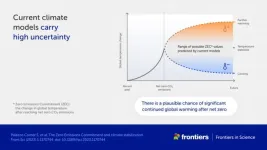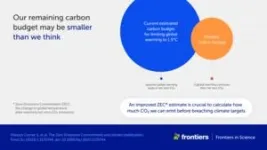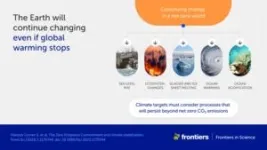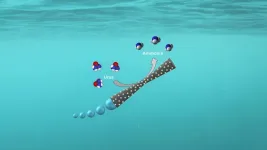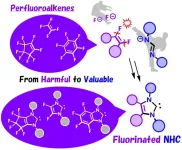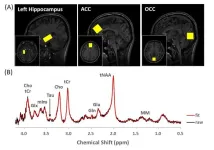(Press-News.org) From scorching heatwaves to torrential downpours and devastating storms, the disastrous effects of global warming are sweeping across the world. Being the predicted outcome of burning fossil fuels, our best and only plan to limit warming is to reduce CO2 emissions from human activities to ‘net zero’ – where the amount of CO2 we emit into the atmosphere is equal to the amount we remove from it. To keep within the 1.5°C limit of the 2015 Paris Agreement, this needs to happen as soon as possible.
Though the scientific community’s current best estimate from models is that global warming will stop at net zero, an article published in Frontiers in Science raises a red flag.
“These estimates come with substantial uncertainty, meaning there is a non-negligible chance that global warming will continue after net zero and intensify dangerous climate change,” said Prof Joeri Rogelj at Imperial College London and one of the international team of authors. “Worldwide emissions reduction plans overlook this important risk, which should be urgently addressed at COP28.”
The article presents the first comprehensive analysis of the many factors controlling global temperatures and provides a framework for improving warming predictions. “Our analysis identifies the levers of global warming after net zero, and explains why current estimates are so uncertain,” said lead author Sofia Palazzo Corner also of Imperial College London.
“The potential of future climate risks in a net zero world makes the need to limit our initial disturbance to the planet even more imperative,” she added. “Crucially for policy, a world that expects warming to continue after net zero will have an even smaller carbon budget to keep total warming below 1.5°C.”
Prof Michael Mann at the University of Pennsylvania said that despite its alarming message on the prospect of continued global warming, this study offers hope. “It reminds us that the obstacles to climate action are neither physical nor technological. At this point, they remain political. And history teaches us that political obstacles can be overcome,” he wrote in an editorial accompanying the article, also published in Frontiers in Science.
Why would global warming continue in a net zero world?
Global temperatures are regulated by multiple natural processes and feedbacks in the oceans, land, and atmosphere. CO2 emissions have influenced many of these, triggering long-term changes which could last for centuries after net zero is reached.
“The melting of ice in polar regions is one example,” explained Prof Martin Siegert of the University of Exeter, another of the study’s authors. “As we have observed in the Arctic Ocean, and recently in the Antarctic, a thin layer of floating ice helps reduce global temperatures by reflecting the sun’s energy back into space. However, once this ice melts this reflection is replaced by absorption of solar energy, which drives temperatures even higher.”
Even current climate models show these processes could cause significant warming after net zero – with an estimated 1 in 6 chance this warming could exceed 15% of total global warming. This means that if global temperatures have risen by 2°C at the point we reach net zero, the final temperature change could be above 2.3°C.
“Warming of this magnitude would worsen major climate risks to communities across the world, and particularly in the most vulnerable regions,” said Siegert.
Toward a better understanding of future global warming risk
Despite persistent progress in the field, exploring the full range of climate change risks is challenging. Models are already very expensive to run and every added process further increases the computational burden.
“We need a collaborative effort between diverse climate experts to develop a suite of scientific tools that allow us to more deeply explore and understand the level of global warming we can expect. Our study takes the first step by mapping all processes that affect global temperatures and estimating their impact across millennia,” said Rogelj.
The international team – which additionally includes researchers from the Lawrence Berkeley National Laboratory, Melbourne University, and the Max Plank Institute – identified 26 distinct processes, of which more than half could drive significant warming.
One example is a decline in land carbon uptake. Plants are important mitigators of global temperatures since they use CO2 during photosynthesis. But other climate processes, such as changing rainfall patterns, droughts, and heatwaves, can reduce the efficacy of this ‘carbon sink’.
“We have drawn on expertise across climate science to build a catalog of processes that could affect global temperatures in a net zero world, but we need to better understand their potential impact. We propose a set of key research activities to reduce this uncertainty and improve warming predictions as quickly as possible,” said Palazzo Corner.
We must reach net zero CO2 as soon as possible
The study’s take-home message is that the future is more uncertain than we think, and so we must adjust our climate mitigation policies to prevent further warming after net zero.
“We are working on building better models, but should not wait until they are perfect before we act. We must take a precautionary approach and drastically reduce emissions now with the goal of achieving net zero CO2 as soon as possible and preventing climate harm to future generations,” warned Rogelj.
“Even if global warming did stop at net zero, we must remember that once started, some processes will continue for centuries,” Siegert added. “Sea-level rise for decades after net zero is an example we must plan for, but there may be others that require further analysis. By urgently cutting emissions we can prevent future risks.”
The article is part of the Frontiers in Science multimedia article hub ‘Global warming after net zero CO2’. The hub features editorials, viewpoints, and policy outlooks from other eminent experts, including: Michael Mann, University of Pennsylvania, USA; H Damon Matthews, Concordia University, Canada.
END
COP28: New study highlights need to address risk of continued global warming after net zero
International experts map uncertainty in current climate modeling and propose a framework to better predict future global warming risk
2023-11-14
ELSE PRESS RELEASES FROM THIS DATE:
14-hour fasting improves hunger, mood and sleep
2023-11-14
Eating in a ten-hour window is associated with higher energy and mood and lower hunger levels, new results from the largest UK community science study of its kind shows1 .
Results from the trial are presented today by researchers from King’s College London at the European Nutrition Conference.
Intermittent fasting (IF), or restricting your food consumption to a set window, is a popular weight loss regime. A ten-hour window means limiting your daily eating schedule to ten hours and fasting for the ...
IOP Publishing unveils industry-leading feedback system for reviewers
2023-11-14
IOP Publishing (IOPP) is now offering peer reviewers feedback on their reviewer reports to enhance the quality of peer review and to strengthen best practice in the physical sciences.
IOPP have rolled out the new programme on an opt-in basis across all its proprietary journals. Where reviewers opt-in for feedback on their report, IOPP will share a numerical evaluation of how useful the report was to the in-house editors on a scale of 1 to 5, with 5 being outstanding and 1 indicating that ...
Assessing the solvency of virtual asset service providers: Are current standards sufficient?
2023-11-14
The collapse of FTX clearly highlights the importance of being able to evaluate the solvency of cryptocurrency exchanges. Currently, this is only possible to a limited extent. That's why researchers from the Complexity Science Hub (CSH), in collaboration with the Financial Market Authority (FMA) and the Austrian National Bank (OeNB), are now proposing a new approach.
Recently, a New York jury found Sam Bankman-Fried, the founder of the cryptocurrency exchange FTX, guilty of money laundering and fraud, among other charges. FTX was one of the largest trading platforms for crypto-assets and was valued at $32 billion before unexpectedly filing for insolvency in November ...
States with legalized medical marijuana see decline in nonmedical opioid use
2023-11-14
Medical cannabis legalization is associated with a decrease in the frequency of nonmedical prescription opioid use, according to a Rutgers study.
The study, published in the International Journal of Mental Health and Addiction, examined data from a nationally representative survey of adults who reported nonmedical prescription opioid use – or using prescription medications without a prescription or in a manner other than prescribed.
According to the study, when states implement medical cannabis laws, there is ...
Cancer stem cells trigger macrophage aging
2023-11-14
Cancer stem cells cause the aging of macrophages in mice with healthy immune systems, creating conditions for the formation of tumors.
Cancerous tumors consist of a mixture of cells, the most important of which are cancer stem cells. These cells are capable of establishing new cancerous tumors by evading the immune response. Research has focused on identifying biomarkers for cancer stem cells and developing therapies that target these cells. Unfortunately, candidate drugs developed from these efforts have so far not been very effective in clinical trials.
A research team led by Associate Professor Haruka Wada ...
New water treatment method can generate green energy
2023-11-14
Researchers from ICIQ in Spain have designed micromotors that move around on their own to purify wastewater. The process creates ammonia, which can serve as a green energy source. Now, an AI method developed at the University of Gothenburg will be used to tune the motors to achieve the best possible results.
Micromotors have emerged as a promising tool for environmental remediation, largely due to their ability to autonomously navigate and perform specific tasks on a microscale. The micromotor is comprised of a tube made of silicon and manganese dioxide in which chemical reactions cause the release of bubbles from one end. These bubbles ...
CPRIT recognized by TAMEST with Kay Bailey Hutchison Distinguished Service Award
2023-11-14
AUSTIN – TAMEST (Texas Academy of Medicine, Engineering, Science and Technology) is pleased to announce the Cancer Prevention and Research Institute of Texas (CPRIT) as the recipient of the Kay Bailey Hutchison Distinguished Service Award.
TAMEST is recognizing CPRIT for their work improving the lives of Texans, advancing cancer research and prevention, and recruiting National Academy members to Texas. CPRIT’s success in attracting top-tier cancer scientists and companies to the state ...
Converting PFAS “forever chemicals” into valuable compounds
2023-11-14
Osaka, Japan – Commonly known as “forever chemicals,” PFAS are notorious for persisting in the environment and in our bodies. Osaka Metropolitan University chemists may put an end to the “forever” life of PFAS with their simple yet innovative technique that converts these harmful substances into valuable compounds.
A research group led by Professor Masato Ohashi and Assistant Professor Kenichi Michigami of the Graduate School of Science at Osaka Metropolitan University has successfully synthesized ligands called fluorine-decorated ...
Women with depression have 20% lower taurine concentration in the hippocampus
2023-11-14
For the first time, a research team in Korea has discovered there is a significant relationship between depression and the taurine concentration in the hippocampus, an area of the brain responsible for memory and learning functions. This discovery provides the opportunity to publicize the role and importance of taurine in future prevention, diagnosis, and treatment of depression.
Using ultra-high magnetic field 7T human MRI (7T MRI), researchers (Drs. Youngkyu Song, Jee-Hyun Cho and Chaejoon Cheong) in the Korea Basic Science Institute (KBSI, President Seong-Kwang Yang) Biochemical Analysis Team have confirmed ...
Genetic testing could greatly benefit patients with depression, save health system millions
2023-11-14
A special kind of genetic test that helps determine the best antidepressant for patients with moderate-to-severe depression could generate substantive health system savings and greatly improve patient outcomes, according to new research from the University of British Columbia.
The study, published today in CMAJ, shows that in B.C. alone, implementing pharmacogenomic testing could save the provincial public health system an estimated $956 million over 20 years.
“Pharmacogenomic testing aims to match patients with medications that are more likely to be effective and cause less side effects, based ...
LAST 30 PRESS RELEASES:
Bureaucracy Index 2026: Business sector hit hardest
ECMWF’s portable global forecasting model OpenIFS now available for all
Yale study challenges notion that aging means decline, finds many older adults improve over time
Korean researchers enable early detection of brain disorders with a single drop of saliva!
Swipe right, but safer
Duke-NUS scientists identify more effective way to detect poultry viruses in live markets
Low-intensity treadmill exercise preconditioning mitigates post-stroke injury in mouse models
How moss helped solve a grave-robbing mystery
How much sleep do teens get? Six-seven hours.
Patients regain weight rapidly after stopping weight loss drugs – but still keep off a quarter of weight lost
GLP-1 diabetes drugs linked to reduced risk of addiction and substance-related death
Councils face industry legal threats for campaigns warning against wood burning stoves
GLP-1 medications get at the heart of addiction: study
Global trauma study highlights shared learning as interest in whole blood resurges
Almost a third of Gen Z men agree a wife should obey her husband
Trapping light on thermal photodetectors shatters speed records
New review highlights the future of tubular solid oxide fuel cells for clean energy systems
Pig farm ammonia pollution may indirectly accelerate climate warming, new study finds
Modified biochar helps compost retain nitrogen and build richer soil organic matter
First gene regulation clinical trials for epilepsy show promising results
Life-changing drug identified for children with rare epilepsy
Husker researchers collaborate to explore fear of spiders
Mayo Clinic researchers discover hidden brain map that may improve epilepsy care
NYCST announces Round 2 Awards for space technology projects
How the Dobbs decision and abortion restrictions changed where medical students apply to residency programs
Microwave frying can help lower oil content for healthier French fries
In MS, wearable sensors may help identify people at risk of worsening disability
Study: Football associated with nearly one in five brain injuries in youth sports
Machine-learning immune-system analysis study may hold clues to personalized medicine
A promising potential therapeutic strategy for Rett syndrome
[Press-News.org] COP28: New study highlights need to address risk of continued global warming after net zeroInternational experts map uncertainty in current climate modeling and propose a framework to better predict future global warming risk
